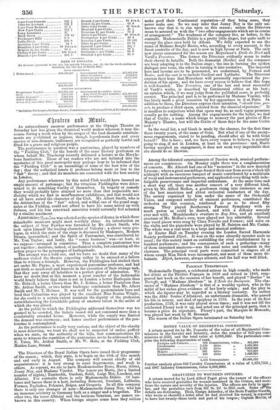The Directors of the Royal Italian Opera have issued their
programme of the season ; which, they state, is to begin on the 10th of this month and end early in August. The company will consist chiefly of old acquaintances : it is very strong in some departments, and weak in others. As soprani, we are to have Mesdemoiselles Bosio, Marai, Albini, Jenny Ney, and Madame Viardot. The tenors are Mario, (for a limited number of nights,) Tamberlik, Gardoni, Soldi, Luigi Mei,•Lucchesi, and Albicini. For contralto there is only Mademoiselle Didiee. Of bari- tones and basses there is a host; including Ronconi, Graziani, Lablache, Formes, Tagliafico, Polonini, Zelger, and Gregorio. In all this company there is only one stranger of note—Mademoiselle Jenny Ney, who has an immense celebrity in Germany both as a singer and a tragedian. The other two, the tenor Albicini and the baritone Graziani, are names un- known in this country. When foreign singers come here they seldom
make good their Continental reputation—if they bring none, they never make one. So we may infer that Jenny Ney is the only un- known star that is to rise upon us this season ; unless the Directors mean to astound us with the " two other engagements which are in course of arrangement." The weakness of the company lies, as before, in the contralti. Mademoiselle Dicliee is a pretty little singer, but quite unfit to- occupy the place once held by Alboni. We fully expected to see the name of Madame Borghi Memo, who, according to every account, is the finest contralto of the day, and is now in high favour at Paris. The only new pieces announced for the season are Meyerbeer's Etoile du Nord and Verdi's Trovatore. The former the Directors evidently mean to make their cheval de bataille. Both the dramatist (Scribe) and the composer are busy adapting it to the Italian stage ; the one in turning the spoken dialogue into verse, the other in turning it into recitative. The imperial hero and heroine are to be personated, we understand, by Formes and Bosio; and the cast is to include Gardoni and Lablache. The Directors express their hope that Meyerbeer will personally superintend the pro- duction of his opera; and we have every reason to believe that this hope is well founded. The Trovatore, one of the last and most successful of Verdi's works, is described by Continental critics as his best ; an opinion which, if we may judge from the published score, is probably correct. The principal part is to be performed by Madame Viardot, who has lately made a great sensation by her appearance in it at Paris. In addition to these, the Directors express their intention, "should time per- mit, to produce a third opera, selected from the classical repertoire." It is needless to conjecture what that opera may be, as such vague promises usually go for nothing. Among the engagements for the ballet, we find that of Cerito; a name which brings to memory the past glories of Her Majesty's Theatre, but will the Cerito of those days be the same Cerito now ?
In the vocal list, a sad blank is made by the absence, for the first time these twenty years, of the name of Grisi. But what if ono of the anony- mous engagements, stated to be pending, should after all be with Grisi herself ? She is here ; and, we have every reason to believe, is actually going to sing, if not in London, at least in the provinces : and, Mario having accepted an engagement, it does not seem very improbable that she should do so likewise.


























 Previous page
Previous page